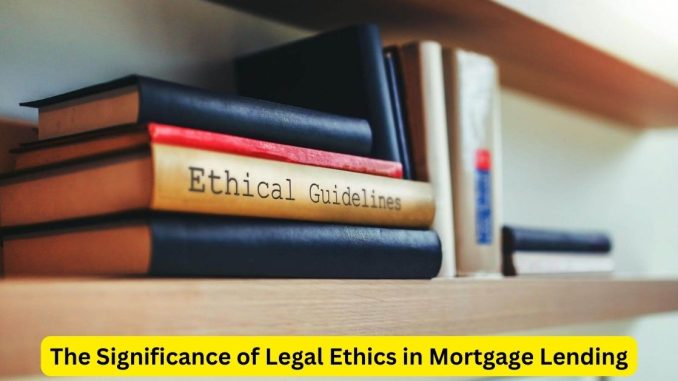
In the domain of mortgage lending, the intersection of legal ethics and professional conduct holds profound importance. Upholding ethical standards is not just a moral imperative but a fundamental aspect that shapes the integrity of transactions and relationships within the lending landscape.
Legal professionals engaged in mortgage lending are bound by ethical codes that dictate their behavior and responsibilities. These ethics, often governed by bar associations and regulatory bodies, establish guidelines for attorneys to ensure transparency, fairness, and professionalism in their interactions with clients, lenders, and other parties involved in real estate transactions.
One of the primary ethical considerations for attorneys in mortgage lending is maintaining client confidentiality. Attorneys are entrusted with sensitive information, and preserving client confidentiality is paramount. Safeguarding client data not only builds trust but also ensures compliance with legal obligations and regulations pertaining to privacy and confidentiality.
Additionally, attorneys are obligated to provide competent representation to their clients. In the realm of mortgage lending, this entails possessing a thorough understanding of real estate laws, regulations, and lending practices. Ensuring clients are well-informed about their rights and obligations within the lending process is an ethical responsibility that attorneys must fulfill.
Furthermore, attorneys must avoid conflicts of interest. In mortgage lending scenarios, conflicts of interest can arise when attorneys have competing interests or are influenced by external factors that compromise their ability to provide unbiased counsel. Upholding ethical standards requires attorneys to identify and mitigate such conflicts, prioritizing their clients’ best interests above all else.
Ethical considerations also extend to the transparency of fees and billing practices. Attorneys must provide clear, understandable explanations of their fees, ensuring clients have a comprehensive understanding of the costs associated with legal services. This transparency fosters trust and demonstrates a commitment to ethical conduct in financial dealings.
Moreover, ethical behavior in mortgage lending involves refraining from engaging in fraudulent or deceptive practices. Attorneys are expected to uphold the law and act in an honest, truthful manner, avoiding any actions that could mislead clients or other stakeholders involved in the lending process.
In essence, the ethical framework guiding attorneys in mortgage lending is foundational in maintaining the integrity and trustworthiness of the legal profession within this domain. By adhering to ethical principles, attorneys not only fulfill their professional responsibilities but also contribute to a fair and transparent mortgage lending landscape, ultimately benefiting clients and the broader community.
In conclusion, legal ethics play an indispensable role in shaping the conduct and responsibilities of attorneys engaged in mortgage lending. Upholding ethical standards ensures client confidentiality, competence in representation, avoidance of conflicts of interest, transparent billing practices, and adherence to laws, fostering trust and integrity in real estate transactions.
Leave a Reply